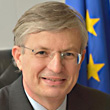news
November 2013
Health is a value in itself
It is also a condition for economic prosperity and social cohesion, says Tonio Borg, European Commissioner for Health, in this welcome to the conference
The Presidency Conference in Vilnius is an important event to further discuss the reforms needed to ensure inclusive, resilient, sustainable health systems that can provide citizens the healthcare they need for generations to come.
We still have a significant task ahead in shifting the current predominant perception of health as a "cost". I am persuaded that this conference, with its focus on the contribution that health brings to inclusive growth in Europe, will further make the case for "investing in health".
I firmly believe that health is a value in itself. And it is also a condition for economic prosperity and social cohesion. Inclusive, performing, effective health systems are a key indicator of the true wealth of societies. Health is a "growth friendly" expenditure. This is why I am keen to support Member States in 'Investing in Health'. This is about engaging further in health systems sustainability, in promoting health as a human capital; and in reducing inequalities in health. It requires coordination, cooperation and commitment from all.
Health systems inclusiveness and effectiveness must go hand in hand. If a health system is not performing well, it will not be able to provide healthcare to all. It is clear that the time has come for structural reforms in Europe's health systems so as to secure universality and quality of care for current and future generations.
Efficiency checks
I believe that all national health systems can benefit from an efficiency check, from greater use of health technology and from a greater focus on smart investments. The question is not so much whether we spend more or less, but how to spend better.
The organisation and the funding of health care systems is a national responsibility. The European Union, however, can improve the context in which Member States operate their health systems and support them in their actions. There is a lot we can do in the EU to support innovation and research in health, encourage co-operation between health systems and to develop synergies with other sectors.
The Commission encourages cooperation between the national health systems. The recent entry into force of the Directive on Patients' Rights in Cross-border Healthcare enshrines citizens' right to go to another EU country for treatment and get reimbursed for it. For patients, this Directive means empowerment: greater choice of healthcare, more information, easier recognition of prescriptions across-borders. The Directive is also good news for Europe's health systems, improving cooperation between Member States on interoperable eHealth tools, the use of health technology assessment, and the pooling of rare expertise.
Equitable health policies
The Commission, through the EU economic governance processes, will continue to play its role in encouraging Member States towards the dual aim of providing access to high quality care and using public resources in health more efficiently.
EU funds will be channelled to support innovative, sustainable and equitable health policies, in particular through the EU Health Programme, the Research Programme Horizon 2020, and the European Structural and Investment Funds.
Investing in health is also about promoting health as a human capital. Good health is good for people. This is why we need to step up work to promote health, prevent disease in a cost-effective manner, and support patient empowerment. The fact that disease prevention only accounts for some 3 per cent of health expenditure illustrates the magnitude of the challenge of changing deep-rooted attitudes in government, but also in business, civil society and public opinion.
I am looking forward to the Presidency Conference in Vilnius on 20 November.”

